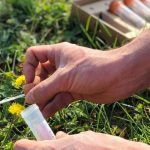
Tag Archives biological inputs

Biologicals, biostimulants make way into Prairie crop plans
But with more companies entering the biologicals and biostimulant space, Prairie growers are being urged to look past the hype and dig into the data

Demystifying biological inputs
A new partnership brings science-based field data to ag input listings to help growers sort fact from fiction

Using nematodes to control crop pests
Alberta research and U.S. commercialization suggest soil-dwelling nematodes could become a practical option for Prairie pest control

Plant-based plant protection

Biologicals aren’t the silver bullet
The products can be complements, not replacements, for other inputs

Nitrogen-fixing biologicals fall short at field level
Challenges remain for products to achieve their hoped-for potential

Ways to improve the microbiome
Scientists consider how we could better support relationships between plants, soil and microbes

Farmer interest growing in plant biostimulants
Companies hope to fill an existing 'knowledge gap' about the purpose of these products

Nutrien buys into biocontrol
How did the seller — oil company Suncor — wind up in crop pest control?

Understanding biological crop inputs
Strip trials may be the best way to determine how and when these emerging products provide value to growers


